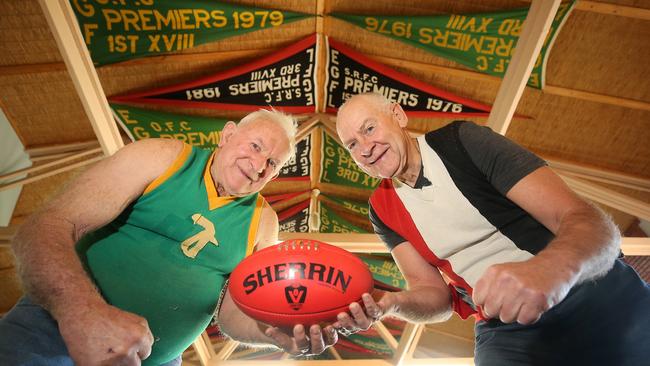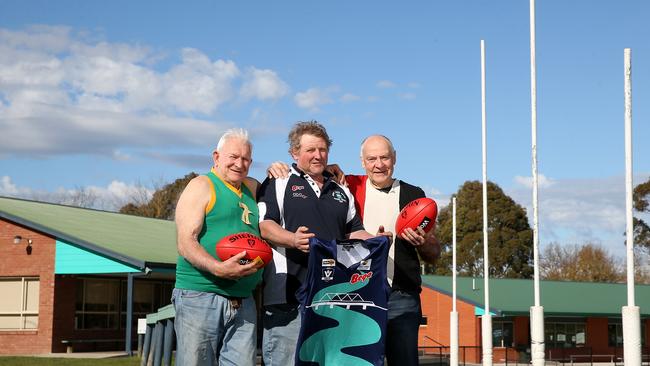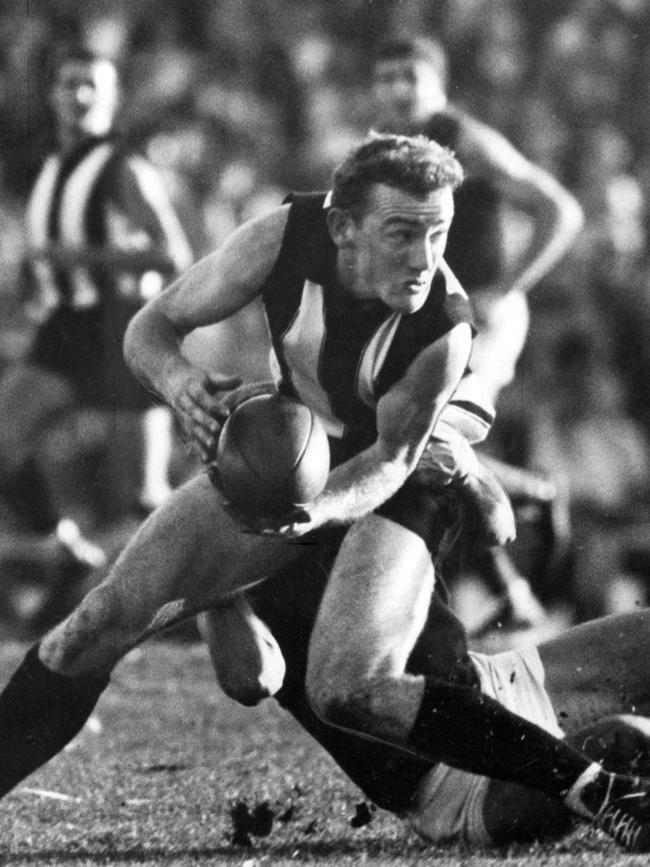East Gippsland: Orbost-Snowy Rovers glory years reunions
A ferocious rivalry ended when two East Gippsland clubs merged 20 years ago, and now it faces another challenge with the demise of the timber industry.
How times change.
Between 1972 and 1985, Orbost and fierce cross-town rival Snowy Rovers won 13 of the 14 grand finals played.
The dominant era started when Orbost won its final flag in the old Gippsland league and ended with Snowy Rovers winning a record four premierships in a row in the East Gippsland league.
A booming timber industry that included mills dotted across the countryside at Newmerella, Waygara, Bemm River and Cabbage Tree underpinned the town’s economic health, and ensured sustained success of two football teams.
Orbost and Snowy Rovers read the play on the changing landscape, and buried their intense rivalry by merging 20 years ago.

Despite the doom and gloom of the timber industry’s imminent death knell, Orbost-Snowy Rovers is in the mix to play finals this season.
Coinciding with a big test against ladder leaders Wy Yung on Saturday will be some reflection on the glory years.
Reunions are being held for senior premierships won by Snowy Rovers in 1973, 1983 and 1984 and Orbost in 1972 as well as reserves flags won by both clubs.
The 1973 premiership was coached by Garry Voss and the 1983-84 teams were led by Jack Light, who also coached the club’s 1982 and 1985 flags, in their record run.
Light worked in the timber industry along with players Trevor Wait, Jack Ash and three Brunt brothers.
Kevin McDonald drove log trucks and farmed with brothers Colin and Brian, who also played for Snowy Rovers.
Light was aged 16 when he started working in the timber industry and retired nearly 50 years later with the last two decades spent as the Brodribb mill manager.
“It’s devastating what has happened,” he said.
“In the ’70s, ’80s and ’90s we had a very good forestry industry association that stood up for all the mills in the area.
“But over time, in fighting the Greens, we would lose more and more ground.”
Light said football was the ideal release for players who started early and finished late working in the bush.
“Tuesday nights were a light night on the training track because they either camped out or got home late,” he said.
“You might get 10 or 15 turn up, but on Thursday nights they were nearly all back in town and you would have your 40 or 50 on the track.
“They didn’t need a lot of training because they were carrying chainsaws all day and just needed a bit of mileage in their legs.
“Rovers had a lot of players who were wiry and tough.
“We played on a small ground and teams hated coming there to play because there was a lot of close contact.”
Orbost’s population nudged 4000 people when Snowy Rovers formed in 1970 and the two clubs took an instant dislike to each other.
They played off in a grand final for the first time in 1973 with Snowy Rovers beating Orbost 13.11 (89) to 10.16 (76).
Players swapping between the two intensified the rivalry with Voss and Light two of the highest profile players to play for both clubs.

Voss played in five flags for Orbost before becoming Snowy Rovers inaugural coach and led them to a flag in 1973 and three in a row from 1976 before going back to Orbost to coach another premiership in 1981.
Light played in four flags for Orbost before the switch to Snowy Rovers to take over as coach from Voss.
The 1982 premiership Snowy Rovers won by 59 points required a replay after the initial match with Lakes Entrance resulted in a draw, 6.14 (50) apiece, a week earlier.
The following season Snowy Rovers came from fourth to win the flag by a point over Orbost courtesy of a goal from Stuart Smith with five seconds to play.

Orbost and Snowy Rovers also had good results with teachers who moved to the area including former Collingwood player, Ted Potter, who played in his only premiership for Orbost in 1975.
Orbost-Snowy Rovers current coach, Peter Seal, is the principal of the town’s secondary college, with a large percentage of this year’s team being former students of the school.
Club president Royston Nettleton said the club’s short to medium-term future would hinge on how long those same players remained living and working locally.
“What will happen in five years’ time I don’t know,” he said.
“Many of the current players are living in the moment.
“The feeling is still good around the footy club, but with what is going on, people have concerns for the whole town, which ultimately affects the footy and netball club.
“We just need to hold on for now.”




